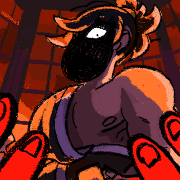|
Yeah I extremely did NOT remember right. I recalled monks specifically getting a good die for their unarmed strike damage and so foolishly assumed that factored into any of their powers at any point. I suppose the answer actually lives in whether the power is close/melee and whether it does untyped or typed/elemental damage and mostly ends up being your call either way.
|
|
|
|

|
| # ? Apr 27, 2024 23:41 |
|
With all the debate about interesting moves in combat, it always feels that everyone forgets the issue of RPGs making those hard to use by definition by eliminating safe experimentation. Since you can’t just reload the game, or play that opponent’s army again next time, the scope to try tactics and learn from them is massively limited. That throttles any attempt at mechanical depth.
|
|
|
|
I'm not forgetting that, it's just not true of a well designed game. I ran a 1-20 campaign in 4E and when my friends levelled up they coordinated their power selections and always knew exactly what horrible bullshit they were going to pull in the next combat My poor monsters were the ones being experimented on
|
|
|
Tarnop posted:I'm not forgetting that, it's just not true of a well designed game. I ran a 1-20 campaign in 4E and when my friends levelled up they coordinated their power selections and always knew exactly what horrible bullshit they were going to pull in the next combat Same for FFG L5R. It's amazing the bullshit players will try when the dice can't randomly decide to end them out of nowhere.
|
|
|
|
|
If anything, the endless grind of pointless filler encounters in many D&D4e published adventures gave players all too much time to experiment with tactics as they squashed kobold minions and shoved giant rats into lockers etc.
|
|
|
|
Squash fights don’t let you learn how to use tactics well. If anything they train in bad habits when players start expecting to win.
|
|
|
|
hyphz posted:With all the debate about interesting moves in combat, it always feels that everyone forgets the issue of RPGs making those hard to use by definition by eliminating safe experimentation. Since you can’t just reload the game, or play that opponent’s army again next time, the scope to try tactics and learn from them is massively limited. That throttles any attempt at mechanical depth. That's only true if the outcome of combat is always death. A lot of systems can have your characters lose badly in a fight and still get away to try later or with a different approach or whatever.
|
|
|
|
Yeah, narrative driven games can have outcomes to fights other than "one side is all dead". For example in Fate you can set your sides outcome to be "we capture them" on either side and being taken out involuntarily merely means you cede narrative control over your character until the next scene. That can result in death if you want to play it that way but it doesn't have to and is discouraged.
|
|
|
|
More games should crib Tenra Bansho Zero's great idea that when you die it's because the player chooses to do it meaningfully and otherwise when fights go wrong you suffer other consequences (as appropriate to the game system and setting.) Even if it's a tediously serious and grim fantasy story where death is swift and life is cheap or whatever, you can make character death more interesting than the wet fart of a random save or die. In fact, it *empowers* the idea of a save or die because you can always not die... at a cost. You can even run a peasant meat grinder character funnel like that and it still works. (Games should not crib Tenra Bansho Zero's art direction)
|
|
|
|
Lambo Trillrissian posted:More games should crib Tenra Bansho Zero's great idea that when you die it's because the player chooses to do it meaningfully and otherwise when fights go wrong you suffer other consequences (as appropriate to the game system and setting.) Even if it's a tediously serious and grim fantasy story where death is swift and life is cheap or whatever, you can make character death more interesting than the wet fart of a random save or die. In fact, it *empowers* the idea of a save or die because you can always not die... at a cost. You can even run a peasant meat grinder character funnel like that and it still works.
|
|
|
|
If it's okay for me to do so, my game Friendship, Effort, Victory uses the Death Box mechanic to control lethality. I'd say more but it's 2am.
|
|
|
|
On one hand, I do like giving people opportunities to test their tactics and really get good at the game. On the other hand, i do think RPGs where everything laid in front of you is designed to be beatable if you want to straight-up fight it is kinda bad, and i prefer a more sim approach to combat than the bespoke, designer-curated options of 4e or Lancer. Sometimes, it's good that your group of four rugged survivors in twilight 2000 is going to be fuckin mulched if they try to straight up fight a platoon of Russian soldiers supported by a BMP and maybe they need to find something else to do.
|
|
|
|
Panzeh posted:On one hand, I do like giving people opportunities to test their tactics and really get good at the game. On the other hand, i do think RPGs where everything laid in front of you is designed to be beatable if you want to straight-up fight it is kinda bad, and i prefer a more sim approach to combat than the bespoke, designer-curated options of 4e or Lancer. If you want to run a battle like that, use Feng Shui, Outgunned, or Everyday Heroes
|
|
|
|
Panzeh posted:On one hand, I do like giving people opportunities to test their tactics and really get good at the game. On the other hand, i do think RPGs where everything laid in front of you is designed to be beatable if you want to straight-up fight it is kinda bad, and i prefer a more sim approach to combat than the bespoke, designer-curated options of 4e or Lancer. I don't think there's anything in the 4e or Lancer rules that require you to do that though? You can totally pitch a party of four first-level adventurers against an encounter of eight level 4 orcs if you want to.The difference in 4e is that because encounter building actually has math and thought behind it you stand a decent chance of differentiating between "even fight", "will use up their resources and punish them", "they might stand a chance of getting away" and "will instantly murder them all on the first round of combat".
|
|
|
|
The rules don't have to literally prevent you from doing something for that assessment to be fair, though. An unwinnable fight in LANCER or D&D 4E is a waste of time; all the depth in those systems comes from "how much of your resources do you have to expend to win," and breaking the curve renders that measurement meaningless. Of course, I'm coming at this from the opposite angle; I love LANCER and 4E and think a highly-detailed, crunchy simulation of an unwinnable fight that only exists as a mechanical disincentive to engage in direct combat, rather than coming up with a clever narrative solution, is pointless; why would you do that instead of just handling it narratively from the get-go?
|
|
|
|
I think there's space in a tightly-built tactics game for the players to have to figure out why the right they're in is unwinnable, but that's a far corner case for the sake of drama and variety, and if it happens more than once in the course of a campaign then the GM should go to jail.
|
|
|
|
I guess I don't really feel like every single situation that the players run into should be 'winnable' through the game's combat mechanism. I don't know, i don't really think that's the GM's job. If they want to go shoot it out with a BMP company when they're four dudes with rifles, they should probably eat it, the responsibility of the GM is to give them every chance to decide what they want to do about it. I think it'd probably in the grand scheme of things be healthier to have player-characters take every situation as it is rather than labor under the idea that everything in front of them is scaled to be a gourmet combat encounter.
|
|
|
|
Tuxedo Catfish posted:The rules don't have to literally prevent you from doing something for that assessment to be fair, though. An unwinnable fight in LANCER or D&D 4E is a waste of time; all the depth in those systems comes from "how much of your resources do you have to expend to win," and breaking the curve renders that measurement meaningless. Would a variant approach of “how much of your resources do you have to expend to get away”/“to prevent something bad” not fit into LANCER or 4e?
|
|
|
|
Panzeh posted:On one hand, I do like giving people opportunities to test their tactics and really get good at the game. On the other hand, i do think RPGs where everything laid in front of you is designed to be beatable if you want to straight-up fight it is kinda bad, and i prefer a more sim approach to combat than the bespoke, designer-curated options of 4e or Lancer. I had a situation like this come up in the T2k game I ran. Only the Spetsnaz team had no BMP and the players didn't realize they were driving into ambush. The Spetsnaz had time to set up an ambush and they had a RPG. A direct hit to their vehicle by the RPG ended them before they or the other Spetsnaz team could do anything. After the fact I could see how this was overkill, but, in my defense, they managed to take out a platoon of Soviet soldiers with a BMP before. And that was the last timed I GMed. DocBubonic fucked around with this message at 20:29 on Mar 28, 2024 |
|
|
|
DocBubonic posted:I had a situation like this come up in the T2k game I ran. Only the Spetsnaz team had no BMP and the players didn't realize they were driving into ambush. The Spetsnaz had time to set up an ambush and they had a RPG. A direct hit to their vehicle by the RPG ended them before they or the other Spetsnaz team could do anything. After the fact I could see how this was overkill, but, in my defense, they managed to take out a platoon of Soviet soldiers with a BMP before. Yeah, that's a rough time- i feel like if i give the players proper warning i'm relieved of the need to nudge things for them and just trust that when they're making a choice they're good with the result. Though yeah i might consider an upper bound on things i'll let the players encounter, at least randomly.
|
|
|
|
As usual this seems like a game genre negotiation thing. It would be interesting if there was a way to frame things which are superficially combat encounters but are, or become, unwinnable into escape-scenarios or something. I guess you get the problem of PCs being like 'My guy wouldn't run away!!!' of course.
|
|
|
|
|
Subjunctive posted:Would a variant approach of “how much of your resources do you have to expend to get away”/“to prevent something bad” not fit into LANCER or 4e? That'd probably work, yeah. The key thing is really just preserving the attritional model because that basically is the game.
|
|
|
|
DocBubonic posted:I had a situation like this come up in the T2k game I ran. Only the Spetsnaz team had no BMP and the players didn't realize they were driving into ambush. The Spetsnaz had time to set up an ambush and they had a RPG. A direct hit to their vehicle by the RPG ended them before they or the other Spetsnaz team could do anything. After the fact I could see how this was overkill, but, in my defense, they managed to take out a platoon of Soviet soldiers with a BMP before. Before most of you were born  I was playing in Ilor's Shadowrun game. One of our team members tried to do some recon before we pulled a score on a police impound lot by talking to Some Local Youths, but he critically failed his role. The GM decided that a critical failure in this context should mean one of the Youths was a police CI, so our brilliant "sudden and overwhelming force" attack turned out to be a "sudden but wildly insufficient force" attack instead. It took us just a couple turns to realize this was not winnable and to change our plan to full retreat, but it always felt true to the setting. We might have felt a little raw about it if Ilor hadn't explained what went wrong to us after the session, but once we knew, it all made total sense. I was playing in Ilor's Shadowrun game. One of our team members tried to do some recon before we pulled a score on a police impound lot by talking to Some Local Youths, but he critically failed his role. The GM decided that a critical failure in this context should mean one of the Youths was a police CI, so our brilliant "sudden and overwhelming force" attack turned out to be a "sudden but wildly insufficient force" attack instead. It took us just a couple turns to realize this was not winnable and to change our plan to full retreat, but it always felt true to the setting. We might have felt a little raw about it if Ilor hadn't explained what went wrong to us after the session, but once we knew, it all made total sense.More recently, we play a lot of Apocalypse World, and it's very common for Ilor to say, "Sure, you can do that, but understand that you are in battle and the enemy is doing 3-harm, so there is no path for you to come out of this unscathed," or occasionally the even more straightforward, "I don't think you understand the fictional situation I'm describing. He has a gun at your head. His finger is on the trigger. If you try to pull a knife and stab him, you will die."
|
|
|
|
Tarnop posted:Sure, but I think most of the time when people are unhappy with the I Just Attack class it's for a couple of reasons that aren't just "simple classes shouldn't exist": Oh, agreed on all points. My problem with the 5e fighter being the simple fighter is made worse by the fact we already have the barbarian. I have no problems with a simple and smashy class existing and the barbarian fits the bill perfectly. But if the barbarian does that why do we also need the fighter to?
|
|
|
|
Subjunctive posted:Would a variant approach of “how much of your resources do you have to expend to get away”/“to prevent something bad” not fit into LANCER or 4e? If a fight isn't meant to be winnable then you just don't roll initiative, or even bother giving the opposition stat blocks, because in 4e at least it's a modest amount of work to input everything into your preferred VTT. In that case, at least in 4e, you should probably be open about your expectations and prompt the players on what they want to do to delay/evade/misdirect the enemy, and run it as a skill challenge, without ever officially "entering combat." And even then, "lose a healing surge on failed skill check" and/or "spend a surge to salvage a failed check" are relatively standard consequences to add meaningful resource attrition to a noncombat encounter. You can even extend the "skill check to escape combat" concept to a normal fight, too, although I don't think any official adventure ever suggests it. So yeah, 4e at least does support "spending resources to avoid something bad" in a way that slots into the games normal resource attrition model, if you follow the later skill check design and also ignore all the examples they provide you.
|
|
|
|
I don't know if this totally fucks up 4E, but it does seem like in this case you could also expend Daily abilities in order to get rerolls or +1s or something. (Even if you're not really fighting the guy, casting Fireball or something might stall them.)
|
|
|
|
|
To what extent is the concept of "Illusionism" a real thing, a strawman of the "trad" playstyle, or something else? I was thinking about this blog post in particular: https://bankuei.wordpress.com/2009/12/15/the-roots-of-the-big-problems/ Christopher Chinn posted:White Wolf games promoted a style of play in which the GM ushers the players’ characters through a pre-written story. The problem is that the GM is supposed to do this without the players ever realizing that their choices are limited or non-existent- in fact, contrary to what the rules state (“Players control the characters”) – hence the “illusion”. This post is from 14 years ago, and I think Chinn himself would probably say that "has become a common standard for most roleplaying games" is less true now. But it's still commonly asserted that this was at least a very common way of playing tabletop RPGs in the 90s, for which White Wolf was partly to blame. (Though I don't think I've ever seen anyone confess to having been this kind of GM in the 90s.) I'm too young to know firsthand how people played tabletop RPGs in the 90s myself. So I'm curious to hear people's thoughts:
Silver2195 fucked around with this message at 22:17 on Mar 28, 2024 |
|
|
|
Nessus posted:I don't know if this totally fucks up 4E, but it does seem like in this case you could also expend Daily abilities in order to get rerolls or +1s or something. (Even if you're not really fighting the guy, casting Fireball or something might stall them.) if you're expending a daily i would expect it to have some massive dramatic effect, closer to the player just briefly getting to dictate the narrative to the rest of the table, but that only really differs from what you're describing in degree, not in kind Tuxedo Catfish fucked around with this message at 22:18 on Mar 28, 2024 |
|
|
|
Nessus posted:I don't know if this totally fucks up 4E, but it does seem like in this case you could also expend Daily abilities in order to get rerolls or +1s or something. (Even if you're not really fighting the guy, casting Fireball or something might stall them.) Honestly it's usually even easier than that, since it's pretty common to just allow "roll Arcana to creatively Wizard outside of combat" if it's something vaguely covered by your existing powers already, which might as well be a free success when you're INT-primary and trained in Arcana and probably have at least one random incidental bonus, too. It's not a rule anywhere, but "spend a daily power to un-gently caress a fuckup" feels fair enough to allow.
|
|
|
Tuxedo Catfish posted:if you're expending a daily i would expect it to have some massive dramatic effect, closer to the player just briefly getting to dictate the narrative to the rest of the table, but that only really differs from what you're describing in degree, not in kind 
|
|
|
|
|
Subjunctive posted:Would a variant approach of “how much of your resources do you have to expend to get away”/“to prevent something bad” not fit into LANCER or 4e? LANCER has an entire section outlining how "reduce all opposition hp to 0" is only one possible success state for an encounter among many. Getting away from an overwhelming force, breaking through a defensive line, smash and grab, capture and hold - there's many viable ways of adding some transformative narrative seasoning to the default baby formula if you're a gourmet encounter chef.
|
|
|
|
Silver2195 posted:To what extent is the concept of "Illusionism" a real thing, a strawman of the "trad" playstyle, or something else? Basically, Illusionism was one of Ron Edwards' essay terms coined largely to explain how hundreds of people were enjoying OWoD games even though he had clearly proven they were terrible (which they probably actually were, especially in first editions, but people fudged around it). This was up with his insistance that anything "narrativist" was good, and that an aim should be a "good story", which was said without ever indicating what the difference between a mediocre and a good story was or considering they were massively exaggerating (your RPG is not an "awesome" story. The awesome stories are the ones still in print and loved after hundreds of years) The description is actually wrong, too, but it's a common error. Illusionism is where the GM has a story in mind in advance and the players know that and are, at least implicitly, down for it. They accept that the actual objective of the game is to guess what the GM wants them to do next and do that. They might not directly say that - but then, RPGers lie or omit stuff about their gaming preferences all the time for some reason - but ultimately they're good with it. And if they're good with it? It's fine, honestly. Most Pathfinder modules are based on this kind of thing - there's a few standard challenges, the most common being combat, and then glue sections between them that the PCs can predict their way through. Feng Shui, which gets a ton of love, actively encouraged that structure for games. ("It's an action movie, of course it's about getting to where the next cool fight is.") It's kind of anachronistic to complain about railroading/romeroading and all their friends without considering that doing without all of these things creates a ton of restrictions on the game too.
|
|
|
|
Yeah, in practice, it's one of those things that just depends on table communication. (Like, uh, most issues in roleplaying, turns out?) I've played in some very good games run under the "there is a clear intended story, characters will possess agency in which parts they interact with and how they approach problems, but the story is what it is" model where everyone was on board and had a great time, and it never felt weird or coerced, any more than I would have felt weird or coerced signing up to play beer-league softball and not being allowed to set up a soccer goal and shoot penalty shots. Agreeing to a narrative or genre structure is just like agreeing to a ruleset: if everyone's on the same page, all is well.
|
|
|
|
hyphz posted:The description is actually wrong, too, but it's a common error. Illusionism is where the GM has a story in mind in advance and the players know that and are, at least implicitly, down for it. They accept that the actual objective of the game is to guess what the GM wants them to do next and do that. They might not directly say that - but then, RPGers lie or omit stuff about their gaming preferences all the time for some reason - but ultimately they're good with it. Surely that's not Illusionism, just normal railroading that the players are fine with? I thought that the reason Illusionism was called that was because the GM creates the illusion that player decisions and/or the dice matter, even though they actually don't. quote:And if they're good with it? It's fine, honestly. Most Pathfinder modules are based on this kind of thing - there's a few standard challenges, the most common being combat, and then glue sections between them that the PCs can predict their way through. Feng Shui, which gets a ton of love, actively encouraged that structure for games. ("It's an action movie, of course it's about getting to where the next cool fight is.") It's kind of anachronistic to complain about railroading/romeroading and all their friends without considering that doing without all of these things creates a ton of restrictions on the game too. Pathfinder modules, especially Adventure Paths, tend to be fairly linear - necessarily so in the case of the longer Adventure Paths. But I don't think they're particularly prone to Illusionism in the sense of encouraging GMs to deceive players (at least not the PF2 ones). There was one bit in Age of Ashes that was criticized for going into that kind of territory, with an NPC encountered in two different places in a hexcrawl scenario - normally they would be the same guy, but if he died (probably at the hands of the players) at the first place they encountered him, they would instead encounter his identical twin at the other place. But I think James Jacobs specifically acknowledged criticism of that bit and said they would never do something like that again.
|
|
|
|
I've played in a game where the GM was writing the story, but like, he'd usually be one chapter ahead of us (like two or three months) and have much more fuzzy longer-term plans, so he'd adapt his longer-term ideas to things that the players did. But it was still very much a railroad in that if he had decided last month that we were going to that spot on the map, would deal with these guys, and would win, well, that's what was gonna happen basically. We all understood that was the game so we were OK with it. It was actually the longest-running play-by-post on SA that I've been a part of, it was run in 3.5 D&D, and I really enjoyed the game. There is this underlying question of "who decides what happens next" that each game (game system) must address. It is usually some measure of shared privilege, often with different deciders at different levels of game. Perhaps I decide with absolute impunity what my character will do this round of combat; the GM decides with absolute impunity what my character's god is doing off on his plane; but somewhere in between, there's collaboration about deciding what happens to: the factions operating within this setting, major events between them, minor events, where the party is going and what it's doing right now, what room are we going to look at next and what happens in there, and how is the conversation in this current scene going to go? Commentators like Edwards are full of poo poo because they're presuming to dictate how those responsibilities have to be in order for the game to be good, when actually, it's just a matter of the players of the game - inclusive of any GM that game might have - reaching some mutual agreement or understanding about what they want or enjoy. There's no wrong answer as long as the players are happy, and there's no perfect correct always right answer if one or more of the players aren't digging it.
|
|
|
|
i dont trust any vocab that got invented on a forum or blog
|
|
|
|
Basically the problem with all the RPG theory is that it's literally all invented by some greasy weirdo going 'And that's why my game is good and everything I don't like is terrible' and utterly useless for any other purpose than that.
|
|
|
|
whats the proper MLA format for citing a forum post
|
|
|
|
It's in the MLA book, which I don't own a copy of, but here's a website with an out of date format https://style.mla.org/comment-in-online-forum/
|
|
|
|

|
| # ? Apr 27, 2024 23:41 |
Kwyndig posted:It's in the MLA book, which I don't own a copy of, but here's a website with an out of date format https://style.mla.org/comment-in-online-forum/
|
|
|
|




































